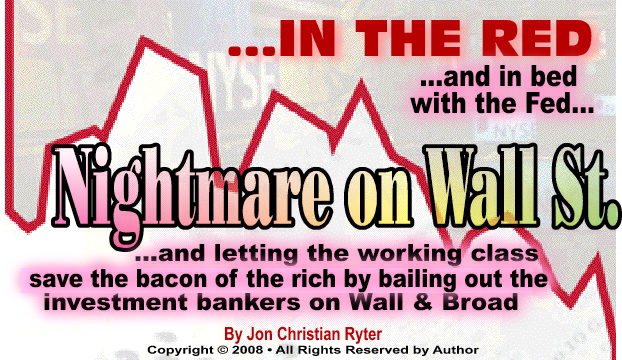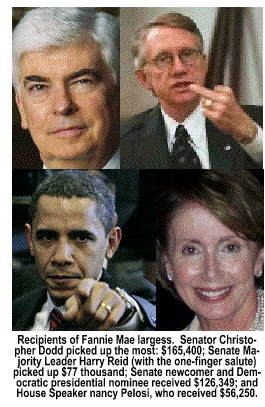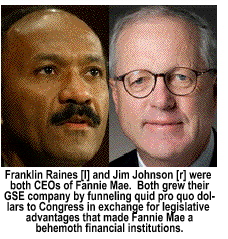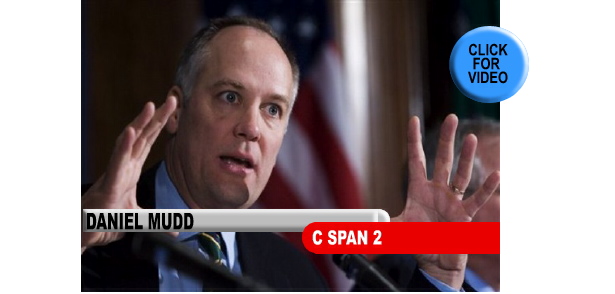
News
Behind the Headlines
Two-Cents Worth
Video of the Week
News Blurbs
Articles
Testimony
Bible Questions
Internet Articles (2015)
Internet Articles (2014)
Internet
Articles (2013)
Internet Articles (2012)
Internet Articles (2011)
Internet Articles (2010)
Internet Articles
(2009)
Internet Articles (2008)
Internet Articles (2007)
Internet Articles (2006)
Internet Articles (2005)
Internet Articles (2004)
Internet Articles (2003)
Internet Articles (2002)
Internet Articles (2001)


 ven
though 78% of the American people reluctantly felt the bailout of Fannie
Mae and Freddie Mac needed to take place as a "necessary
evil" on Monday, Sept. 29 in order to keep the problem from impacting
life on Main Street America, there were over a million reasons why US
taxpayers should not bail out the banking community. America's banks are
drowning in a tsunami of subprime debt from foreclosed toxic mortgages
that are now threatening to sink the entire global banking community.
From that perspective,
there are between 700 to 900 million reasons not to do it. Least of them
is the fact that the banks which approved millions of toxic subprime mortgages,
and the hedge funds that sold the high yield subprime bond issues to eager
investors did so knowing that, historically, people with bad credit histories—for
whatever reason—generally lack the financial liquidity to meet their
debt obligations. The bailout of faltering commercial and investment banks
owned by global banking conglomerates will cost each individual working
class US taxpayers between $2,500 to $3,000 to cover the losses of millionaire
bankers and investors who understood the risks involved in the investment
game when they chose to invest in the subprime market.
ven
though 78% of the American people reluctantly felt the bailout of Fannie
Mae and Freddie Mac needed to take place as a "necessary
evil" on Monday, Sept. 29 in order to keep the problem from impacting
life on Main Street America, there were over a million reasons why US
taxpayers should not bail out the banking community. America's banks are
drowning in a tsunami of subprime debt from foreclosed toxic mortgages
that are now threatening to sink the entire global banking community.
From that perspective,
there are between 700 to 900 million reasons not to do it. Least of them
is the fact that the banks which approved millions of toxic subprime mortgages,
and the hedge funds that sold the high yield subprime bond issues to eager
investors did so knowing that, historically, people with bad credit histories—for
whatever reason—generally lack the financial liquidity to meet their
debt obligations. The bailout of faltering commercial and investment banks
owned by global banking conglomerates will cost each individual working
class US taxpayers between $2,500 to $3,000 to cover the losses of millionaire
bankers and investors who understood the risks involved in the investment
game when they chose to invest in the subprime market.
Before getting into the guts of the subprime debate, it's important for
the American consumer to understand what the bailout suggested by President
George W. Bush and Treasury Secretary Henry Paulson entailed.
It was not a bailout for the rich. It is a bailout of Main Street America.
Under the plan the Resolution Trust Company—which is owned
by the government—would buy the toxic mortgages outright—i.e.:
the bailout. The cost? Roughly $700 billion, give or take a billion.  Over
the next 30 years the taxpayers will receive approximately $1.68 trillion
back, give or take a billion as homeowners with recently foreclosed toxic
mortgages will have the option to get their homes back (with payment modifications
that will allow them to keep their homes by stretching their payments
out over a longer period). Also included in the original Democratic measure
that excluded any Republican participation in structuring the terms of
the bailout, was a provision that allowed banks to dump their subprime
credit card losses as well. That should not be allowed. If the banks were
stupid enough to issue credit cards to consumers who have shown a disregard
for sound fiscal management in the home, they need to eat the debt. (But,
I expect the second version of the Emergency
Economic Stablization Act of 2008 enacted by the US Senate
still carries that provision.)
Over
the next 30 years the taxpayers will receive approximately $1.68 trillion
back, give or take a billion as homeowners with recently foreclosed toxic
mortgages will have the option to get their homes back (with payment modifications
that will allow them to keep their homes by stretching their payments
out over a longer period). Also included in the original Democratic measure
that excluded any Republican participation in structuring the terms of
the bailout, was a provision that allowed banks to dump their subprime
credit card losses as well. That should not be allowed. If the banks were
stupid enough to issue credit cards to consumers who have shown a disregard
for sound fiscal management in the home, they need to eat the debt. (But,
I expect the second version of the Emergency
Economic Stablization Act of 2008 enacted by the US Senate
still carries that provision.)
The purpose of the bailout, once again, is not to shore up fat cat bankers with the mega-million salaries, bonuses and golden umbrellas but to keep a badly mismanaged problem from negatively impacting Main Street America.
And even though the Senate passed the legislation again on Oct. 2, the impact of the decision by the House to reject the bailout on Monday, Sept. 29 rippled across the face of the nation like hundred-year-old skin on Wednesday as credit became virtually non-existent for every consumer without a credit score over 800. Any company in America which relied on lines of credit to pay for inventories or generate sales was in a quandary on Wednesday with sellers finding no buyers, and few buyers finding the credit they needed to buy the products they wanted to take home. Sales of cars from the Big Five—Chrysler, Ford, General Motors, Honda and Toyota—virtually dried up in America's first major "credit holiday" as bankers signalled their disapproval of the US consumer using "voter clout" to bully Congress into submission. When the House finally passed the measure on Oct. 3 and the bill was rushed to the White House for the president's promised signature, Wall Street continued to rumble like a bear with empty stomach.
And while what ultimately rose to about 90% of the nation's population fed by conservative anti-bailout advocacy groups focused their attention on Congress' attempt to "save the whale"—the behemoth financial giants whose bad judgment combined with two bad laws caused the subprime debacle—the American people took their eyes off Main Street where the banking community, fearful of failure, exacerbated the economic woes of the nation by very deliberately over-correcting and hog-tying the economy. Small businesses all across the nation which have relied on open lines of credit from their local banks discovered Wednesday morning that the funds they use to purchase inventory no longer eixsted. Banks in the United States tightened their lending requirements for medium to large companies. Lending to small, mom and pop companies without Dun & Bradstreet ratings became almost non-existent, forcing small business owners to rely on their company and personal credit cards to pay for inventory.
While the full impact of the banking crisis was felt nationwide on Oct. 1, the drying up of the flood of easy credit began earlier this year as the nations largest banks realized that the subprime disaster had seeped into the prime market sector. Hundreds of thousands of US home buyers with good credit were also in danger of losing homes that had been financed with toxic ARM mortgages whose payments were escalating beyond the ability of the homeowners to meet their ARM-adjusted mortgage payments. Yet, even with the legislation signed, sealed and delivered, beltway policy wonks and financial advisors predict it will be close to a year before any financial benefits from the bailout will be felt by consumers. Credit will likely remain tight for six months to a year.
The era of cheap money has ended.
When Congress, fearing voter backlash, began dragging its heels on the bailout, Wall Street began a roller-coast ride reminescent of October, 1929. Public-private partnerships Fannie Mae and Freddie Mac, which started the gut-wrenching cascade of bank failures, investment firm takeovers, high-tech totters, and the devaluation of energy conglomerates—and even the hospitality industry, lost 95% and 94% of their value respectively. Fannie Mae, whose stock plummeted from $36.41 to $1.79 a share, and Freddie Mac, whose stock spiraled down from $36.96 to $1.89 led the race to the bottom of the stock market bar graphs.
Student lender Sallie Mae lost 29% of its value with its stock dropping from $19.36 to $13.94. Sallie Mae troubles will make it harder for college students to secure students loans this year. As expected, the collapses spilled out of the financial sector. Marriott International, which felt the bite as consumer travel waned due to high fuel prices lost 22% of its value when its stock fell from $32.75 to $25.65 a share. Host Hotels & Resorts lost 17% of its value, with its stock edging down from$16.59 to $13.73. The world's largest newspaper chain, Gannett (parent of USA Today), a newspaper and electronic media conglomerate, saw its stock drop from $35.84 to $18.18, losing 49% of its value as advertising revenues plummeted. Gannett announced last week it would cut approximately 1,000 jobs in its community newspapers division. Also biting the bullet was the Washington Post which lost 28% of its value when its stock dropped from $793.70 per share to $561.71 The newspaper cut staff by offering early-retirement packages to several long-term employees.
When the House of Representatives rejected the Emergency Economic Stablization Act of 2008 on Monday, Sept. 29, Dow Jones—which had its fingers crossed that the bailout would be approved—responded by dropping 777.68 points, losing 6.98% of its value. NASDAQ dropped 199.61, or 9.14% of its value—the largest one day drop in its history. Standard & Poor [S&P] dropped 106.85, or 8.81% of its value. In all, America's corporations—which fund all of America's 401K reitrement plans, lost $1.2 trillion when the market slide happened. Which, of course, means the US consumer lost $1.2 trillion in retirement benefits because they told their Congressmen and Senators not to bail out Wall Street. What was orginally thought to be a bailout of the fat cats on Wall and Broad Streets turned out to be a bailout of Main Street America where the fallout of the collapsing market will take roost in the nest eggs of the working class' 401Ks.
On top of that, the Financial Times' Eurofirst 300 recorded its biggest drop since Jan. 21, 2008, and the Irish stock market took its worst one-day plunge in a quarter century. European investors worried that if the US Congress passes a watered-down version of the Emergency Economic Stablization Act of 2008 that it would simply mop up the spilled toxic assets but fail to stem the crisis would trigger a global recession. Even with European central banks injecting liquidity, the money markets continued to deteriorate and index swap rates continued to rise to all time highs—a sign of fresh strains among the central banks of the world. Adding to the subprime debacle was a sudden drop in oil prices. Four European banks, including Bradford & Bingley and Fortis needed government bailouts. Fortis had to be rescued by the combined governments of Belgium, Luxembourg and the Netherlands. And one of Iceland's biggest banks, Glitner, had to be nationalized to keep it from collapsing.
In the US House of Representatives, the Emergency Economic Stablization Act of 2008 fell 12 votes short of passing. GOP House members blame House Speaker Nancy Pelosi who made a very partisan speech and blamed the subprime crisis on President George W. Bush—when the fault lies, very specifically, with Congress whose members, on both sides of the aisle, took millions of dollars in campaign contributions and tailored the legislation the bankers, mortgage companies and real estate giants needed that legalized the toxic, exotic mortgages that allowed home buyers to qualify for homes they simply couldn't afford. The House will address the measure again on Monday, Oct. 6. But even the "add-ons" in the amended version may not sway Republicans who fear that voter backlash will end their congressional careers on Nov. 4. Sadly, if the House rejects the revised Emergency Economic Stablization Act of 2008 bill and the credit crunch cripples the ability of the American consumers to meet their debt obligations or enjoy their current lifestyle, voter backlash will still end those careers. That being the case, the American voters need to understand precisely which party created this mess, which party cancealed the mess, and which party received the bulk of the quid-pro-quo dollars to ignore the mess.
The mess was initially caused by two (or, is that three) Democrats—Jimmy Carter and the co-presidency of Bill and Hillary Clinton. Carter-era and Clinton-era laws were designed to boost minority home ownership without fiscal accountibility. The Clinton Community Re-Investment Act was enacted by a Republican majority in 1997. The GOP spent the entire decade as the majority party letting the far left control their legislative agenda. Under the passive eye of the GOP, the far left created a myriad of federal regulations that forced builders, mortgage companies and banks to make less than sound affirmative action mortgage loans to low-income, high-risk minority consumers.
When Clinton crony Franklin Raines took over Fannie Mae in 1999, the Clintons lobbied Fannie Mae to buy high-risk low-income mortgages, whch actually created the subprime mortgage mess. If House Speaker Pelosi wants to blame a president for the toxic mortgatge mess, she needs to blame either Jimmy Carter or the co-presidency of Bill and Hillary Clinton (since multiculturalism was Hillary's fait accompli).
In 2004 the Republican-led Congress saw the impact of the loose money policies mandated by Carter and Clinton-era laws which virtually forced lending institutions to provide 100% mortgage money to low-income minorities who lacked the financial means to pay the mortgages they would be given, House GSE Subcommittee Chairman Richard Baker launched a hearing on the illegal bookkeeping tactics used by Fannie Mae and Freddie Mac that resulted in officers of Fannie Mae getting $110 million in bonuses at a time when Fannie Mae sales did not merit bonuses. (See video of this hearing at the top of this article.)
Fannie Mae and Freddie Mac, which were the catalysts of the crisis, have a 20-year history of buying politicians. Collectively, both donated $4,844,572 to the campaign coffers of Congressmen, Senators and presidential candidates. (Fannie and Freddie donated $126,349 to Democratic presidential nominee Barack Hussein Obama since January, 2005 and $21,550 to John Sidney McCain since 1989.) In 2005 in the subprime mortgage industry began offering toxic ARM mortgages that all but guaranteed what happened would happen. Please note: McCain's campaign war chest was "enriched" by what amounted to $1,000 per year from the Mae-Mac twins. You don't buy a Washington politician for a annual average contribution one-fourth of what citizen voters can donate. But, even with inflation, you can still buy a pretty powerful politician for $164,500 or even for $126,349. When glib politicians on the campaign trail start talking about who is in bed with whom, you need to take the time to check whose toes are touching whose under the covers.
Sen. McCain co-sponsored
the Federal Housing Enterprise Regulatory Reform Act of 2005 (s.190)
to enact regulatory reform legislation to kill the use of toxic mortgages
that placed low-income or poor credit risk home buyers into homes they
couldn't afford to live in and would almost certainly lose when the mortgage
payments matured.  Sen.
Chris Dodd [D-CT] the ranking Democrat on the Senate Banking Committee—who
took $165,400 from the Mae-Mac twins, is the largest recipient
of quid pro quo dollars from Fannie and Freddie
—and freshman Sen. Obama [D-IL] stopped the legislation from
getting a vote even though Sen. Joe Biden twisted it around in
the Vice Presidential debate with GOP veep nominee Sarah Palin
but suggesting that McCain tried to stymie the bill and Obama
fought to pass it. And he did it without his nose growing an inch.
Sen.
Chris Dodd [D-CT] the ranking Democrat on the Senate Banking Committee—who
took $165,400 from the Mae-Mac twins, is the largest recipient
of quid pro quo dollars from Fannie and Freddie
—and freshman Sen. Obama [D-IL] stopped the legislation from
getting a vote even though Sen. Joe Biden twisted it around in
the Vice Presidential debate with GOP veep nominee Sarah Palin
but suggesting that McCain tried to stymie the bill and Obama
fought to pass it. And he did it without his nose growing an inch.
Senate Majority Leader Harry Reid benefited from $77 thousand in Mae-Mac money. House Speaker Nancy Pelosi pocketed $56,250 and House Majority Leader Steny Hoyer took $55,500. Congressman Barney Frank [D-MA], Chairman of the Financial Services Committee—who will quickly defend Fannie or Freddie—took $42,350.
One hundred-ninety Senators and Congress have accepted from $10,000 to $165,400 from the GSE [Government Sponsored Entity]. The balance of the membership of Congress (with only a handful receiving nothing) received from $100 to $9,999.. Most of those members receiving anywhere from $500 to $1,000 over a 20-year period. Many of those receiving sizable contributions were on the House or Senate banking committees or subcommittees, Commerce, and any subcommittee that dealt with housing or urban affairs; or members of the House or Senate Ways & Means Committees.
McCain tried again on May 25, 2006. Arguing on the floor of the Senate, he said: "I joined as a co-sponsor of the Federal Housing Enterprise Regulatory Reform Act of 2005 to underscore my support for quick passage of GSE regulatory legislation. If Congress does not act, American taxpayers will continue to be exposed to the enormous risk that Fannie Mae and Freddie Mac pose to the housing market, the overall financial system, and the economy as a whole....The Office of Federal Housing Enterprise Oversight's report goes on to say that Fannie Mae employees deliberately and intentionally manipulated financial reports to hit earnings targets in order to trigger bonuses for senior executives. In the case of Franklin Raines, Fannie Mae's former CEO, OFHEO's report shows that over half of Raines' compensation for the 6 years through 2003 was directly tied to meeting earnings targets. The report of financial misconduct at Fannie Mae echoes the deeply troubling $5 billion profit restatement at Freddie Mac. The OFHEO report also states that Fannie Mae used its political power to lobby Congress in an effort to interfere with the regulator's examination of the company's accounting problems. This report comes some weeks after Freddie Mac paid a record $3.8 million fine in a settlement with the Federal Election Commission...These are entities that have demonstrated over and over again that they are deeply in need of reform..."
In the world of the quid pro quo, passing the buck to John Q. Public by Congress is how the game is played. That's how the rich get richer—and that's why they contribute money to political candidates. Politicians use both legislation (usually written by the lobbyists of the donors to specifically benefit the donors) and the public dole (grants and/or low interest federal loans or government contracts) to enrich the "haves" at the expense of the "have-nots."
While the Obama Campaign
has tried hard to suggest that McCain was in bed with Fannie
and Freddie because Rick Davis, his current presidential
campaign manager's former company, Homeownership Alliance, was
paid $35 thousand a month in consulting fees from 2000 to 2002 to help
beat back the regulations that McCain was trying to pass.  In
all, Davis's advocacy group was paid $840 thousand in fees, plus
expenses, from Fannie Mae and Freddie Mac. However, Obama—who
is trying to make it appear he has clean hands when he does not—downplays
the fact that Franklin Raines and Jim Johnson, both former
CEOs of Fannie Mae were major donors and major fundraisers
for his campaign. Likewise, both remain close senior advisers to the Obama
Campaign. Johnson was Raines' predecessor at Fannie
Mae. Both of them are neck-deep in the subprime mortgage scandal.
In
all, Davis's advocacy group was paid $840 thousand in fees, plus
expenses, from Fannie Mae and Freddie Mac. However, Obama—who
is trying to make it appear he has clean hands when he does not—downplays
the fact that Franklin Raines and Jim Johnson, both former
CEOs of Fannie Mae were major donors and major fundraisers
for his campaign. Likewise, both remain close senior advisers to the Obama
Campaign. Johnson was Raines' predecessor at Fannie
Mae. Both of them are neck-deep in the subprime mortgage scandal.
Raines was terminated as Fannie's CEO after being embroiled in an accounting manipulation scandal in which the profits of Fannie Mae were overstated by some $9 billion (later adjusted downward to $6.3 billion), resulting in Raines, his CFO Timothy Howard and controller Leanne Spencer being sued by the Securities & Exchange Commission for $110 million in penalties and for the restitution of $115 million in overpaid bonuses and stock options. In a settlement plea agreement, Raines repaid $24.7 million. Howard repaid $6.4 million and Spencer repaid $275 thousand. Raines also relinquished Fannie Mae stock options, proceeds from stock sales from options already exercised and all other benefits in his golden umbrella. Raines, a close friend and bundler for Al Gore, Jr. in 1992 and 2000, served as assistant of the White House Domestic Policy Staff under Jimmy Carter and as Director of the OMB under Bill Clinton. Johnson, on the other hand, became the head of Obama's veep Search Committee and recommended Sen. Joe Biden [D-DE] as Obama's running mate. Johnson, by the way, was also Walter Mondale's 1984 presidential campaign manager. Raines' CFO, Timothy Howard became Obama's Chief Economic Advisor.
Yet, Barack Obama, the New York Times and the mainstream liberal press would like the voting population in the United States to believe that GOP presidential nominee John McCain is having a three-way with Fannie and Freddie when the only illicit relationship is the three-way between Obama, Raines and Johnson.
Angry Taxpayers
America is mad. Even though nine-out-of-ten Americans believe its wrong, 78% of them nevertheless reluctantly feel the government should go ahead with the subprime bailout to prevent a catastrophic global banking collapse that will topple the global fiat monetary house of cards. A global monetary collapse will destroy the personal wealth of everyone in the industrialized world whose savings are tied up in paper money. The American working class clearly understands there is a gun pressed to their head, and like the Depression Era bank robbers like John Dillinger, Bonnie Parker and Clyde Barrow, and tommygun totin' thieves like Baby Face Nelson, their government is robbing the working class to cover the losses of the rich.
For the most part, those who flooded congressional switchboards with calls while House Democrats scrambled to find enough votes to pass the House version of Emergency Economic Stablization Act of 2008 did not view the bailout as a necessary evil but the end of free enterprise capitalism.
The majority of those calling reflected disgust, resignation and disbelef, with only a handful expressing relief. House Speaker Nancy Pelosi exempted 16 freshmen Democratic Congressmen from voting for the measure because they are in tight races and will likely lose in November if they vote for the bailout. Had the leadership insisted on their votes, the measure would have passed without a single Republican vote. Pelosi, however, knew this was going to be vote that would cost her party seats in November. For that reason, she insisted on a bipartisan effort and woed Republicans to join "their president."
And while Democrats in the House and Senate were determined to enact the Emergency Economic Stablization Act of 2008, the extent to which they were willing to rob the national cookie jar had limits. They are not willing to sacrifice their control over Congress to to enact the bailout. As far as they are concerned, if the crisis worsens it hurts McCain, not Obama who they have successfully tied to the scandal although McCain fought the Fannie fans through the Federal Housing Enterprise Regulatory Reform Act in 2005 when the mortgage lenders, with the approval of the Fedeal Reserve, introduced exotic mortgages to qualify more unqualified people for new homes. That decision, in 2005, was made to create hundreds of thousands of new high-paying construction jobs to conceal the factory job flight as even more US coprorations sent their factories to the third world where tomorrow's consumers are still searching for jobs—our jobs.
Because everyone knows when the bailout happens—and it has too—even though the Dow clawed its way out of the celler on Tuesday, Sept. 30, gaining back half of Monday's losses. The captains of every floundering industry (most harmed by the price of gasoline and industrial energy costs, or by cheap, tariff-free goods from China) are already standing in line with their hands extended.
Uncle Sam was poised to hand over a big chunk of taxpayer money to the US auto industry in the form of a new low interest loan when the bank crisis hit. The airline industry has tapped the good luck bucket more than once over the past decade. Chrysler, which is still searching for an owner with pockets deep enough to support it, still exists because of the Jimmy Carter billion dollar bailout in August, 1979. Add to those the Bill Clinton Amtrak bailout, part one, in 1997 (called the Amtrak Reform and Accountibility Act of 1997) and part two in 2001. Amtrak bailouts go back to Richard Nixon in 1971 when America's bankrupt freight and passenger rail systems were merged into the National Railroad Passenger Corporation, known by the portmanteau word, Amtrak (blending American and track) and nationalized. The bailout was so expensive that the US government owns 100% of the preferred stock of the company. Included in the 1997 Amtrak bill (H.R. 2247) was a CSX Transportation bailout provision that would saddle the taxpayers with damages assessed against CSX or any other rail freight carrier in the national system from lawsuits resulting in train wrecks. Under H.R. 2247, any damages assessed to CSX would be transferred to Amtrak and paid by the taxpayers.
Many in the global investment community are worried about the Bush Administration's commitment to the capital principles that made the United States the most powerful nation in the world from 1938 to 1988. Many are troubled by the financial strategies emanating from Washington, DC where corporate fat cats who ply politicians with money to get them re-elected feel entitled to taxpayer dollars whenever they need a helping hand—and the stealth used by politicians on both sides of the aisle to accommodate those who fill their campaign war chests with what should be recognized by everyone as quid pro quo dollars that absolutely must be outlawed by the US Supreme Court. since Congress is not about to eliminate their ability to enrich themselves as the expense of the citizens of the United States.

Copyright © 2009 Jon Christian Ryter.
All rights reserved.



